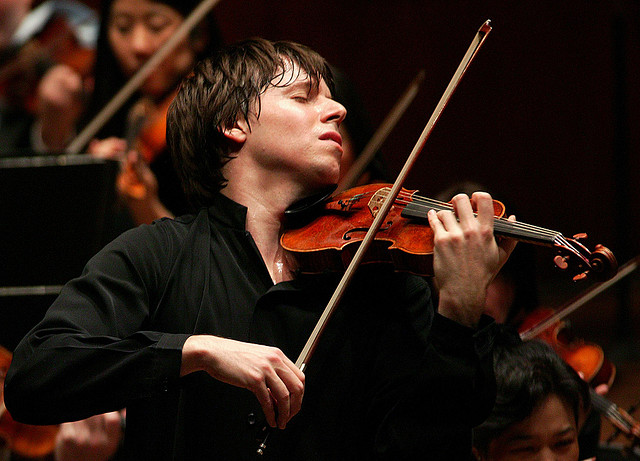Music Review: Joshua Bell and Perry So
I can think of no pieces in the violin repertoire that are as well known as Vivaldi’s “The Four Seasons.” And I can think of very few violinists who are as popular or as marketable as Joshua Bell. So the pairing of the two at the Hollywood Bowl yesterday evening makes loads of sense.
Last night, unfortunately, it also made for quite a disappointing evening of music.

“The Four Seasons’” status as a, well, perennial favorite, means that it has been subjected to some pretty ridiculous treatments over the years. Think of all the fragrance ads set to this music, or the many nauseating crossover versions that regularly top the so-called “classical” charts (google Vanessa Mae’s “Storm” for a particularly egregious specimen). For a real laugh, check out one of the 80’s metal versions – dueling guitarists with blonde locks down to their waists, pounding through the third movement of “Summer” with the amps cranked up to eleven. It’s all in very poor taste, but with music as well worn as “The Four Seasons” it’s to be expected.
One doesn’t, however, expect bad taste from an artist as highly regarded as Joshua Bell. Sadly, in this critic’s experience, there is no reason to anticipate anything better.
I’m particularly allergic to Bell’s ultra-saccharine strain of violin playing. All the undulating and spazzing about on stage is disagreeable enough, but the nervous vibrato and wispy tone that comes with it is just too much for me. Musically, Bell does whatever he likes. Phrases are impulsive rather than organized and his pacing is impetuous instead of thoughtful.
The Philharmonic’s string section, sans conductor for the Vivaldi concerti, did their best to stay with Bell, but his flights of whimsy often proved too overwhelming. The more cohesive musical moments seemed to originate with the fine continuo playing of keyboardist Joanne Pearce Martin and principal cellist Peter Stumpf rather than anything the soloist was doing.
Bell’s best playing came in the slow movements of “Spring” and “Winter.” Here, he traded in the translucent sotto voce that dominated the evening for something considerably thicker. And he simply played the tunes, rather than manipulating them.
But mostly, Bell’s Vivaldi was a haphazard, clumsy affair – intonation suffered throughout, and Bell was remiss in his duties as a leader. This music is just too straightforward to forgive such a presentation.
I realize that Joshua Bell’s musicianship speaks to a great many people. For those who appreciate this sort of performance, Bell’s animated stage presence demonstrates passion, not wildness. Where I find musical recklessness, others see creativity and spontaneity. Luckily, it’s okay to disagree. If you happen to enjoy his playing, don’t let my particular aversion to Bell spoil it for you.
In the second half, the young conductor Perry So led the Philharmonic in a somewhat labored reading of Tchaikovsky’s Serenade for Strings.
There can be no doubt that So has a bright future ahead of him. One of the Phil’s inaugural Dudamel Conducting Fellows, he was appointed Assistant Conductor of the Hong Kong Philharmonic in 2008 and became their Associate Conductor in 2010. His technique has a certain playfulness to it, and the waltz movement benefited particularly. But So often appeared sclerotic on the podium, and the orchestra never quite warmed to him.
Intonation was problematic all evening long, but string-only repertoire is especially challenging in that regard. The highlight of the program came in the Tchaikovsky’s third movement “Élégie,” when the soaring violin melody suddenly turns to counter-melody and the cellos take over with a rich operatic tenor. Perhaps due to the lack of wind and brass instruments in this music, the cellos are given much more responsibility than usual. Where the violins often struggled with cohesion and consistency, the cellos rose to the occasion.
Perry So handled the difficult transition between the final two movements of the Serenade with much aplomb, and gave us a quick, emphatic “Finale.” But this excited musical exclamation mark seemed entirely misplaced on a mostly disappointing evening.
Reach music critic Jason Issokson here. Follow Jason on Twitter: @Philharmaniac.



